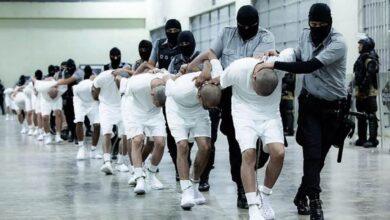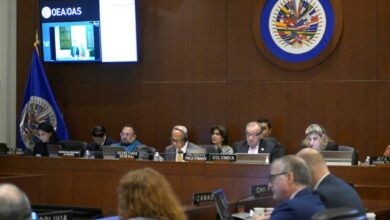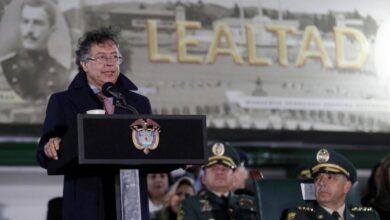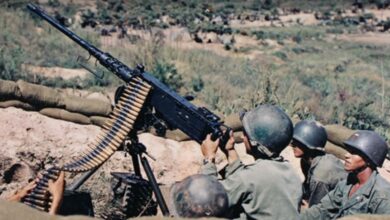Winter in Europe: a chance for peace in Ukraine or a chance to escalate the war?
The arrival of winter in Europe raises two possible hypotheses for experts amid the war between Ukraine and Russia: achieve a truce for as long as this situation lasts or take advantage of it to gain ground over the Russians.

Photo: AP
LatinAmerican Post | Christopher Ramírez
Escucha este artículo
Leer en español: Invierno en Europa: ¿una oportunidad de paz en Ucrania o una ocasión de encrudecer la guerra?
On February 24, the Russian army, under the command of its president Vladimir Putin, planted itself on the border with Ukraine, to start what has been the most important geopolitical news of this year to date: the invasion of that country.
Although the figures for fatalities are ambiguous and depend on the organization, institution, or State that publishes them, according to the Ukrainian Attorney General, Andrii Kostin, more than 8,300 civilians have lost their lives in Ukraine since the Kremlin ordered the invasion. . For its part, the Ukrainian news agency UNIAN details that among the deceased there are more than 430 minors, while the injured exceed 11,000.
Even with this reality, for the Ukrainian government, talking about peace negotiations is not an option, since, as President Volodimir Zelensky explained at a security forum in Canada, “amoral commitments will bring more blood. A genuine and lasting peace can only be the result of the complete dismantling of all elements of Russian aggression."
YOU MAY ALSO BE INTERESTED IN: Ukraine: The negotiation for peace is not seen as a priority in the government
The 'Cold' Peace?
Now, during the confrontation and the non-option to negotiate on the part of the Russians and Ukrainians, there could be an opportunity for a truce that, although forced, could give life to the troops and civilian population who already need a break from the Russian bombing: winter.
For many experts, although it is uncertain what could happen in the midst of what the mayor of Kyiv (Ukrainian capital), Vitali Klitschko, indicated will be "the worst winter since World War II", some are optimistic when seeing this climatic situation as a 'stop' to hostilities between the two parties, or at least an opportunity for Ukraine to shake off the Russian onslaught.
In recent weeks, attacks by Russian forces, especially from the air, have affected half of the country's electrical infrastructure, which analysts say cannot be easily repaired.
Faced with this, those with the greatest expectation are the member countries of the North Atlantic Treaty Organization (NATO), who have had to rethink the type of aid they will send to Ukraine, with materials to restore the electricity grid.
Only Germany has promised a sum of 150 million euros to be able to help the Ukrainian people during the winter, while NATO as an organization has designated the delivery of items such as blankets, warm clothing, and tents, as well as generators and transformers. to alternatively transmit electric power to Ukraine. It should be remembered that, between December and March, temperatures in Ukraine usually drop between -4.8 °C and 2 °C, so heating becomes an essential service to survive.
However, for countries like the United States and Germany itself, this situation, which could also negatively affect the Russians, does not necessarily mean a bilateral ceasefire, so it is essential to think about the civilian population and not abandon support for Ukrainian forces.
This was stated by the Lithuanian Minister of Foreign Affairs, Gabrielus Landsbergis, who after visiting Kyiv assured that the country needs more tanks and anti-aircraft systems to counter Russian attacks, especially in the eastern part of the territory. "Keep calm and give tanks!" The diplomat wrote on his Twitter account. It is important to note that Landsbergis's request is not unreasonable, considering that the strength of the Ukrainian Army is mainly based on ground attacks; a detail that could also be used during the winter.
Currently, the Russians maintain control of large areas of the Lugansk region (western Ukraine), which they obtained with the help of their air force and the little ground activation of the Ukrainians on that side of the country. For this reason, it is important that, according to the Ukrainian plans, the soils manage to freeze to make use of wheeled vehicles and try to take control of a territory that has practically been in the hands of Kremlin soldiers since the beginning of the invasion.
In addition, it is also worth highlighting the fact that the Russians are much stronger than their enemies with air strikes or with the use of long-range artillery, however, this option could be null before the fog and snow storms that could limit their vision and lead to ineffective attacks.
Now, this scene that on paper could turn positive for Ukrainians could also be written in a different way, if the storms, instead of being icy, are rainy. If it happens in this way, experts say that the Ukrainian forces would be the most affected, since they are the least capable of moving in deep and muddy terrain.
This is how the Russians won the Battle of Stalingrad in 1943, with a Nazi army mired in mud and despair, and a Red Army (Russian Army) made strong by what they considered “General Winter”.
The truth is that both hypotheses are just that, ideas that are brewing in the minds of military strategists, who at the moment of truth must make forceful decisions in real-time, whether to attack the enemy, defend each other or make a “Christmas Truce”, like the one that occurred between France and Germany in 1914. At that time, the soldiers on both sides decided to put down their weapons for a moment and celebrate the holidays (and protect themselves from the cold) with a strange but friendly game of soccer.
Will there be a temporary peace in this war that has already lasted for more than 9 months or will both governments see this situation as a privileged opportunity to gain ground in the war? Only the passing of the weeks and the weather conditions that arise can define this reality.





